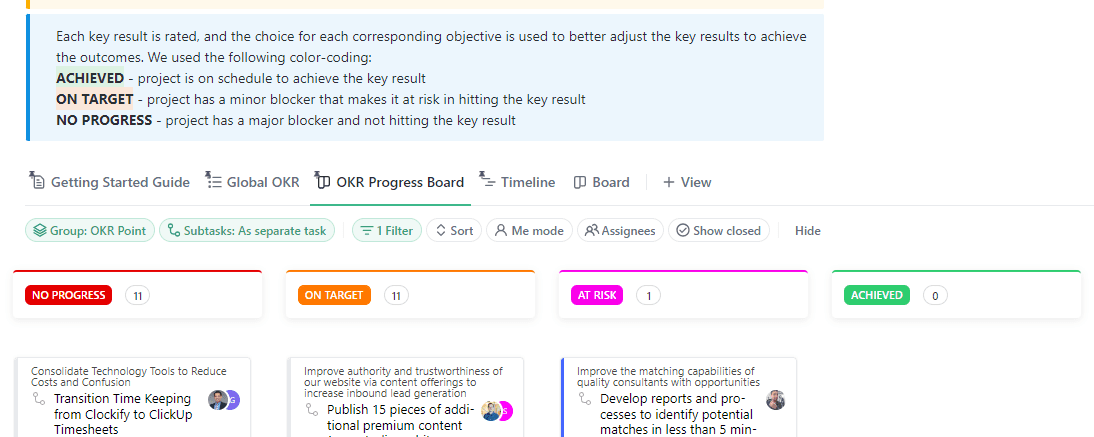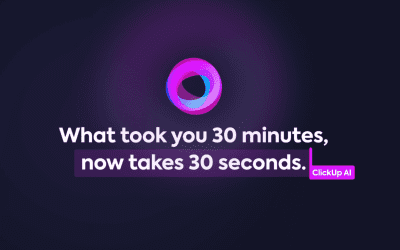
Summary: As Q4 draws to a close, Tuck Consulting Group employees and consultants alike are taking stock of the past three months and of 2023 in general. It’s been a great year for our organization, capped off by our #356 ranking in the 2023 edition of the Inc 5000.
Aside from gaining new clients and growing our engagements, we’ve enhanced our internal tech stack. We migrated from Microsoft Dynamics to the HubSpot CRM (and we’re a HubSpot Solutions Partner), rolled out a fully-integrated PandaDoc solution, and became a ClickUp Ruby Tier Partner. We owe our progress to the Objectives & Key Results framework. In this blog, we’re going to share tips on how you can implement it, too.
The Origins of Objectives and Key Results (OKRs)
The investor and author, John Doerr, is generally considered to be the evangelist for the Objectives & Key Results (OKRs) framework. Doerr’s Measure What Matters is essential reading for many MBA students and aspiring executives. In fact, he has an entire website devoted to the subject.
Doerr credits one of his mentors at Intel, Andrew Grove, for coming up with the methodology and teaching it to Intel employees. Here’s a clip of Doerr lecturing on Grove and the OKR methodology that Grove used at Intel.
For the uninitiated, the OKR system is composed of:
- Objectives: The goals that the organization wants to achieve
- Key Results: Measurable outcomes that help you achieve an Objective
While we’re oversimplifying the concept, WhatMatters.com can fill in the gaps. More importantly, ClickUp provides an OKR template out-of-the-box. This means ClickUp customers can set up their own OKR system in minutes. What a great way to start planning for 2024!
ClickUp’s Template Center
For the purpose of this blog post, we’ll assume that you have some basic knowledge of ClickUp. For a refresher or a quick intro to the project management tool, check out ClickUp University.
Since Objectives are generally overarching goals (“launch new product management division,” “enter cloud storage market,” etc.), we typically list them as Tasks. The Key Results that lead to the accomplishment of the overarching Objective are typically listed as Subtasks. And we generally store all of them in a List.
However, ClickUp clients don’t even need to start that mental exercise. ClickUp’s Template Center contains a pre-built OKR list (called ‘OKR Framework’). After you download it into the space where you intend to document OKRs, you can populate Objectives and Key Results as described above. Even better, the OKR Framework template comes with a handy user guide at the top and a whole “Getting Started” ClickUp Doc so you and your teammates can quickly review how to use it without another Google search.
Making the OKR Template Our Own
While ClickUp’s OKR Framework is excellent as-is, we made a few customizations to have it fit our needs. Since we’re a lean organization, every employee contributes to the organization’s OKRs (and even a few of our outside consultants do too). Plus, everyone contributing to OKRs can see the rest of the team’s progress. In addition to the great out-of-the-box functionality the template gives us, we also made some of the following customizations to make it our own:
- We replaced the Progress % Bar with a new Progress Field with a simple 1-10 slider. The Progress % Bar was nice, but it calculated completion percentage based on the status of the subtasks, checklists, and assigned comments which didn’t allow for weighting of importance. While the simple 1-10 slider is great as an MVP for us, we’re going to build more sophisticated calculations with weightings as we mature our OKR processes within ClickUp.
- We updated the Departments to match the way our organization is set up.
- We changed the views to give us the level of visibility that we needed across the organization.
- We build out project plans under each KR with goal start and end dates, assignments, and Priority levels. We also leverage tasks in multiple lists to allow for visibility of the tasks within the lists where we do most of our work (e.g., Tuck Marketing Activities, Sales Ops Activities). If you’re not using TIML, you’re missing out on one of the best features that ClickUp has over anything else on the market.
Taking it a Step Further
While there are plenty of quality resources available online for implementing OKRs within your organization, obtaining buy-in across the board may be difficult. A skilled and objective Project Management coach or Change Management professional can take the pressure off of team leaders by conducting OKR workshops and actually driving the work towards achieving Key Results. The Tuck consultant bench includes specialists for project management, change management, and management consulting. By bringing one of them into your organization, you can ensure that your team pursues meaningful Key Results that align with ambitious Objectives. We’d love to learn more about your business challenges and explore how a Tuck consultant can help. Book a meeting with us here.

Andrew Guidarelli
Strategy & Partnerships
As Tuck’s Strategy and Partnerships manager, Andrew builds and nurtures relationships with the vendors and teammates that help us solve problems for clients. He’s also responsible for Sales operations and business capture. Outside of work, Andrew enjoys jogging (not running ![]() ) and catching live music acts at one of DC’s myriad venues.
) and catching live music acts at one of DC’s myriad venues.


